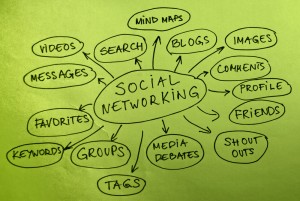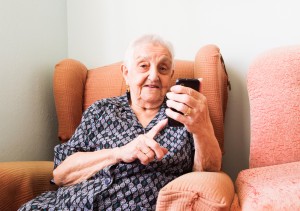
I love the Internet and all the positives it represents. Even so, I often take it and the near ubiquitous benefit it offers for granted.
How many of us can really remember Life Before The Internet? How did we procrastinate effectively before @EmrgencyKittens? How did we keep in touch, inform others of our lunch habits and make 500 new ‘friends’ in the period between the carrier pigeon and email?
Quite simply, the Internet has revolutionised the way many of us live our lives, from how we do our weekly shop and book cinema tickets to how we experience illness and seek out information, support and human contact.

The Internet has brought us many things….including @EmrgencyKittens
Social networks and psychosis
The virtual reality of the Internet has paradoxically enabled us to expand our real social networks and it is this potential for developing meaningful contact with others that is of particular interest to those working with people with psychosis, whose social networks are frequently smaller and less robust when compared to the general population.
Reduced social interactions in people with psychosis are related to a number of factors, including:
- Symptom-specific characteristics (e.g. withdrawal, paranoia)
- Deficits in non-verbal communication (e.g. problems engaging with social cues)
- Negative social impact of illness (e.g. unemployment or stigma)
Online social networking may offer valuable opportunities to create social bonds for people with psychosis. However, there is also concern that many people are not aware of how to use the Internet safely and that reliance on the Internet may lead to reduced motivation to maintain real-world contacts.

Online social networking may offer valuable opportunities to create social bonds for people with psychosis.
Aims
In this systematic review, Highton-Williams et al. explored the evidence relating to the use of online social networking in people with psychosis with the aim of developing a better understanding of whether online social networking is used by people with psychosis and how it may be integrated into strategies aimed at increasing social support.
Their research questions were:
- What are the existing data on the use of online social networking in people with psychosis?
- Has any difference been identified between people with psychosis and other clinical/non-clinical populations?
- For what purposes do people with psychosis use online networking?
Methods
- The researchers systematically searched through electronic databases: MEDLINE, Embase, PsycINFO, Web of Knowledge, the British Nursing Index and CINAHL.
- They included studies examining the use of online social networking by people with a diagnosis of psychosis or bipolar disorder.
- Studies were included if they explored any type of online social networking (defined as any social interaction occurring online), on any type of online social networking site (SNS), with the exception of interactions between participants and mental health professionals.
- Similarly, studies were excluded if they examined online psychological or psychosocial interventions (including exclusion of online interventions with a social networking component).

The reviewers were interested in how and why people with psychosis used online social networking.
Results
- A total of 2,780 records were retrieved, with 64 full-text papers examined.
- 11 studies reported data on online social networking of people with psychosis, published between 2005 and 2013.
- Study designs included case reports, observational and qualitative designs.
- The total number of patients with psychosis assessed in 9 of the 11 included studies was 1,189. Two studies did not report numbers of individual patients assessed.
- Broadly, the studies suggest that people with psychosis use the Internet more frequently than control groups for the purposes of social networking, spending more time in chat rooms or online games. However, Internet usage and SNS participation rates were highly variable.
- Reasons for using online social networking were identified as:
- Establishing new relationships
- Maintaining relationships/reconnecting with people
- Online peer support
- Some studies suggested that people with psychosis may find e-mail or Facebook less preferable than other online social networking tools. Online networking through e-mail and Facebook may be used predominately to connect with an existing social network.
- Little evidence was found of risks relating to online social networking (e.g. increased isolation, bullying). However, the reviewers were keen to point out that risk was not a primary research question of their review and that this is therefore an area requiring more systematic exploration.
Implications
- Communication difficulties of people with psychosis in establishing and maintaining social networks may not constitute significant hurdles to online social networking.
- Online forums or chat rooms could facilitate the establishment of new social relations for patients who have fewer offline contacts.
- Online social networking could be used alongside standard befriending schemes.
- Key questions should be addressed with experimental studies, that is:
- What is the best social networking tool to be used for people with psychosis in terms of benefits/risks profile?
- Whether (and which kind of) online social contacts can become supportive offline relationships?
Discussion
This is the first systematic review of the available international literature on the use of online social networking of people with psychosis. However, the authors are keen to point out significant limitations, namely:
- The heterogeneity of the study designs, which allowed only narrative review;
- The reliance upon self-reported diagnosis in some of the included designs;
- The authors’ own decision to collapse schizophrenia-related disorders and bipolar disorders into a convenient ‘psychosis’ group.
These limitations (particularly the latter) should not be underestimated. Heterogeneity of study design is a real problem in digital research and is a game changer in the way it precludes being able to draw confident conclusions (e.g. Alvarez-Jiminez et al, 2014).
Teasing apart key differences in Internet access and usage is widely acknowledged to be an important part of digital research and appropriate and effective tailoring of online resources is an integral part of adherence and engagement with any form of online intervention (e.g. Dutton & Blank, 2013; Webb et al., 2010).
If the aim of such a review is to try and determine the role of online social networking in self-management strategies for those with psychosis, it is crucially important to know specifically what works when and for whom.
As a consequence of these limitations, the authors have to speculate about what some of the individual differences might be that influence online social networking in clinical and non-clinical populations. They refer to the availability and accessibility of the Internet, co-morbid social anxiety and differences in the ways in which people interpret the anonymity of online social networks.

Heterogeneity of study design is a real problem in digital research.
Considerations
- This review echoes a recent report on the high rates of Internet usage amongst those living with chronic, multimorbid or unusual illnesses (Pew Research Centre, 2013). Although often having reduced access to the Internet (e.g. only at home as opposed to at work and socially), this key group is online significantly more and often much more engaged with their own health than other patient groups, as much of their online activity is related to their health and information and support seeking.
- In reality, the idea of the digital divide is a diminishing concept – smartphone access is pretty much ubiquitous and if anything, a new form of digital divide is emerging between 2.0 and 3.0 users, that is, between ‘regular’ use of email, online shopping and the Internet in general and those who also produce online content. In my experience as a mental health support worker at Rethink, access to the Internet was not necessarily a defining difference: larger concerns existed around people’s ability to evaluate information and understand the importance of online etiquette, security and privacy.

94% of the UK adult population now use a mobile phone (Ofcom, 2014).
This is an emerging research field and this review makes an important contribution to it. However, it raises as many questions as it answers and highlights the importance of more in depth, targeted empirical and qualitative work. More research needs to be conducted on the specifics of how to best facilitate social networking in vulnerable groups and for what purpose – simply getting online is not enough.
Links
Highton-Williamson E, Priebe S & Giacco D. (2014). Online social networking in people with psychosis: A systematic review. International Journal of Social Psychiatry 1–10 [Abstract]
Alvarez-Jimenez M, Alcazar-Corcoles M, González-Blanch C, Bendall S, McGorry PD, & Gleeson JF. Online, social media and mobile technologies for psychosis treatment: a systematic review on novel user-led interventions. Schizophr Res. 2014 Jun;156(1):96-106. [Abstract]
Dutton WH, Blank G. Cultures of the internet: the internet in Britain. Oxford Internet Survey 2013 Report. Oxford: Oxford Internet Institute, University of Oxford, 2013. [PDF]
Webb TL, Joseph J, Yardley L, Michie S. Using the internet to promote health behavior change: a systematic review and meta-analysis of the impact of theoretical basis, use of behavior change techniques, and mode of delivery on efficacy. J Med 2010; 12(1): e4
Pew Research Center, November 2013, “The Diagnosis Difference” [PDF]
Facts and figures, Ofcom 2014.



RT @Mental_Elf: Online social networking and psychosis http://t.co/gQ43JHYGtN
Online social networking and psychosis: Nikki Newhouse reports on a recent systematic review of online social … http://t.co/36LMrexCwM
Kirsten Corden liked this on Facebook.
Amanda Collins-Eade liked this on Facebook.
Hi @stefanpriebe We’ve blogged about your online social networking & psychosis SR http://t.co/5Mtt7LLWnx Pls let us know what you think
Many thanks to the @Mental_Elf for covering our review on online social networking and psychosis: @stefanpriebe http://t.co/IXSm2amFmW
Mental Elf have published our review on social networking in psychosis http://t.co/WmSzDtnZQT @Betty_Highton @SocialPsychQMUL @Mental_Elf
Today @nikkinewhouse blogs about the first SR on the use of online social networking by people with psychosis http://t.co/5Mtt7LLWnx
Lyn Roast liked this on Facebook.
RT @SocialPsychQMUL: Mental Elf have published our review on social networking in psychosis http://t.co/zRAoiBLKJv @Betty_Highton @SocialPs…
The Mental Elf liked this on Facebook.
Online social networking may offer valuable opportunities to create social bonds for people with psychosis http://t.co/5Mtt7LLWnx
Check out my latest for @Mental_Elf on the first SR on the use of online social networking by people with psychosis http://t.co/ruFTUjFx5n
.@nikkinewhouse A fine addition to your growing portfolio of @Mental_Elf blogs :-) http://t.co/wVJDK6y5my
@Mental_Elf My 9th! How time flies etc etc.. :)
Thanks for well summarising the study and the many open questions left!
Christina Armstrong-Graham liked this on Facebook.
RT @Mental_Elf: Review finds that ppl w/ psychosis use Internet more frequently than control groups for purposes of social networking http:…
Review finds that ppl w/ psychosis use Internet more frequently than control groups for purposes of social networking http://t.co/pOlGEKf0JS
Heterogeneity of study design is a real problem in digital research http://t.co/5Mtt7LLWnx
Online social networking and psychosis http://t.co/nmBLSbKV35< interesting post from @Mental_Elf
RT @Mental_Elf: What’s the best social networking tool to be used by people with psychosis, in terms of benefits/risks profile? http://t.co…
Don’t miss: Online social networking and psychosis http://t.co/5Mtt7LLWnx
@Mental_Elf good link
Las intervenciones online basadas en las redes sociales pueden reducir el aislamiento en las personas con psicosis http://t.co/BXtgFosttU
RT- @Mental_Elf Don’t miss:Online social networking and psychosis http://t.co/aPEMTdEAfA Focus-Psychosis Feb 20 in LB http://t.co/lm3p6PsGtw
Lucy Riddett liked this on Facebook.
Tracey Hunter liked this on Facebook.
RT @AllenFrancesMD: Online social networking is very helpful for people with psychosis
http://t.co/kz0sHHzmop @Mental_Elf
Tackle the issue of isolation through social networking. Why not?
http://t.co/oOkqCquxzZ
Nikki, thank you for your blog post outlining our recent review. As you pointed out, people’s ability to appropriately evaluate information available on the internet, and concerns about security and privacy are an important avenue for future empirical investigation. Our review suggested that online social networking may be a useful tool for social connectedness in people with psychosis. However, it also showed that the literature in this field is still scarce and there is an inconsistency of designs and methods across studies. Given the widespread availability of internet, there is a need for more systematic evidence on benefits and risks of online social networking. We hope that the review, and blog posts such as these help inform the emerging interest in research on online social networking!
Donna Allen Matthews liked this on Facebook.
.@Betty_Highton Tx for your comment on @nikkinewhouse’s blog, which has now been approved http://t.co/BrxN37X43n
@Mental_Elf @Betty_Highton Thx for your comment. You sum up the fun of social networking research perfectly :)
Systematic review on online social networking and psychosis http://t.co/wxKArMcXUk via @Mental_Elf #mentalhealth
Great to add to todays #hcsmct topic RT @MindmapVinod: Online social networking and psychosis http://t.co/JMiHn4oEb4 via @sharethis
“Online social networking and psychosis” Systematic review via @mental_elf http://t.co/KmHbP8kEPc
We found this article on online social networking and psychosis http://t.co/qqqoaA63mi via @sharethis #hcsmct #mhsm #mentalhealth
Online social networking and psychosis http://t.co/YiBP9Zv9YR via @sharethis
Online Social Networking And Psychosis http://t.co/vbNxb8ZCiQ
[…] Every week another research study is interpreted beneath a sensational headline, or analysed by this blog. […]